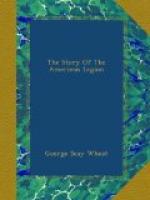General Hoffman of Oklahoma obtained recognition from the chair as some of the delegates already were rising to leave the theater. “I move, Mr. Chairman,” shouted the General, “that we extend a vote of thanks to Colonel Roosevelt and Colonel Clark and other gentlemen who have been associated with them and to the chairman of this association and his able assistants who have brought this convention to such a happy and successful close.”
At the mention of Colonel Roosevelt’s name departing delegates tarried and when Mr. Weinman of Louisiana moved adjournment, the house stood and with one accord began to cry, “We want Teddy,” “We want Teddy.”
Colonel Roosevelt walked to the center of the stage and raised both hands seeking silence.
“I want to say just one thing,” he said. “I have never been so much impressed in my life as I have been by the actions of this caucus, actions of the various committees and in the way this caucus thought for itself and acted for itself. For instance it would receive resolutions from the Resolutions Committee, would think them over, would re-decide on them and would re-decide them right. I want to say in closing that the only thing I regret is that my father could not have been alive at this moment to see the actions of this body of Americans.”
Mr. Healey of the New York delegation obtained the attention of the chair. “I make a motion,” stated Mr. Healey, “that before this great caucus adjourns we should remain standing in one minute’s silence as a tribute to the greatest statesman that this nation has ever produced—THEODORE ROOSEVELT.”
CHAPTER XIII
WHY THE AMERICAN LEGION?
As I glance back over these pages I am impressed with the fact that only the preface of “The Story of the American Legion” has been written here. When the reaches of the years shall gather to themselves the last of the men of the army, navy, and marine corps of the United States during its war against Germany that story may then be faithfully told. So the truth of the matter now is that history is in the writing so far as the American Legion in its relation to the United States of America is concerned. That statement isn’t in reality as platitudinous as it seems at first thought.
We have arrived at world importance in history. We have come to that as the result of our part in the world war. Our isolation is over. We are the cynosure of all eyes. Uncle Sam is the dominant world figure; his hands control the reins that are driving the world. He has the enemies which all the successful have. There are those who had, and haven’t, and there are those who never had, and want; all desiring, all envying the power of the United States of America. This great power and position was gained primarily by one motive—unselfishness. Just so long as it is our dominant trait will we retain what we have gained. Just so long as we remain true to our innate principles, to the tenets of our constitution, will we retain world importance and world influence.




